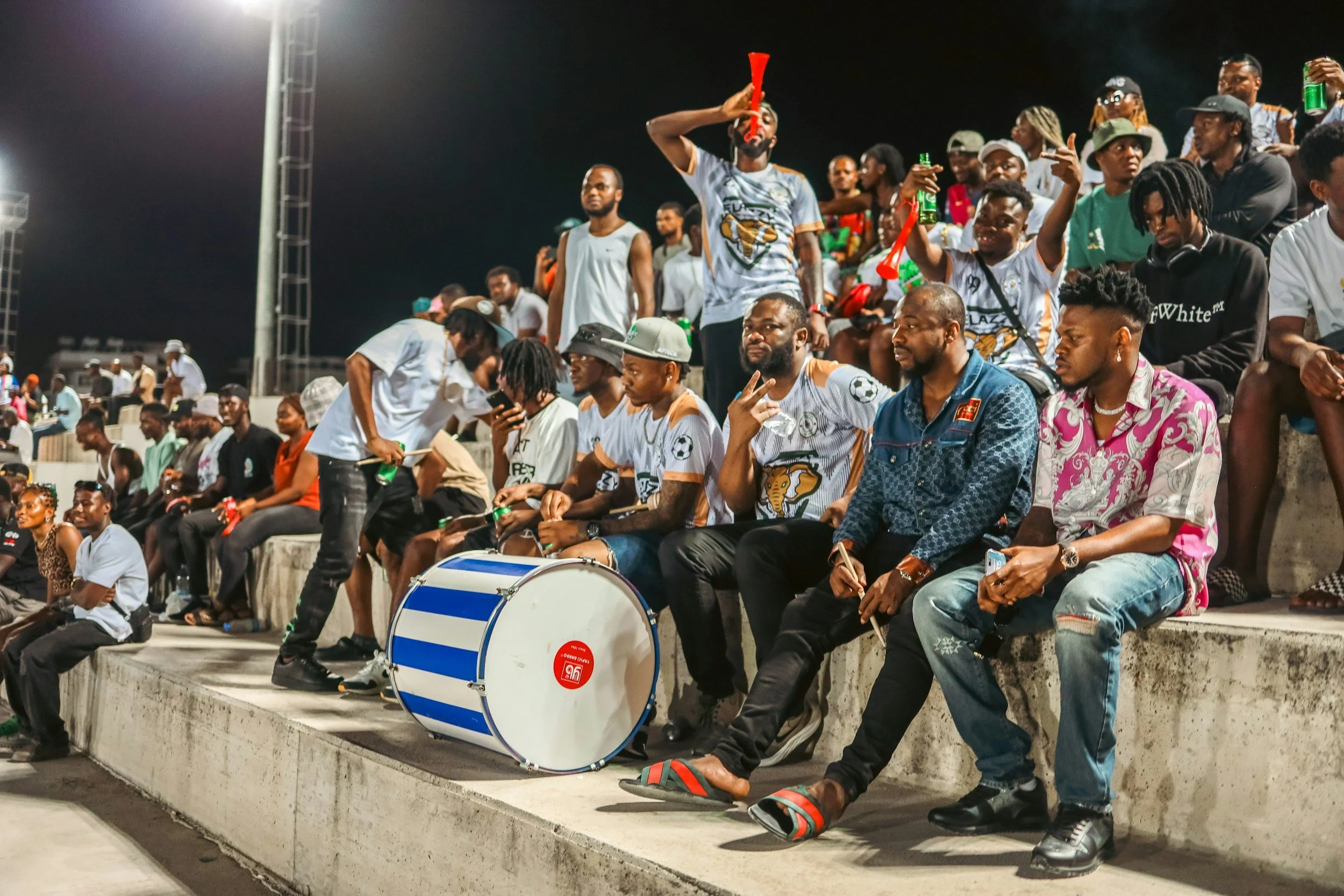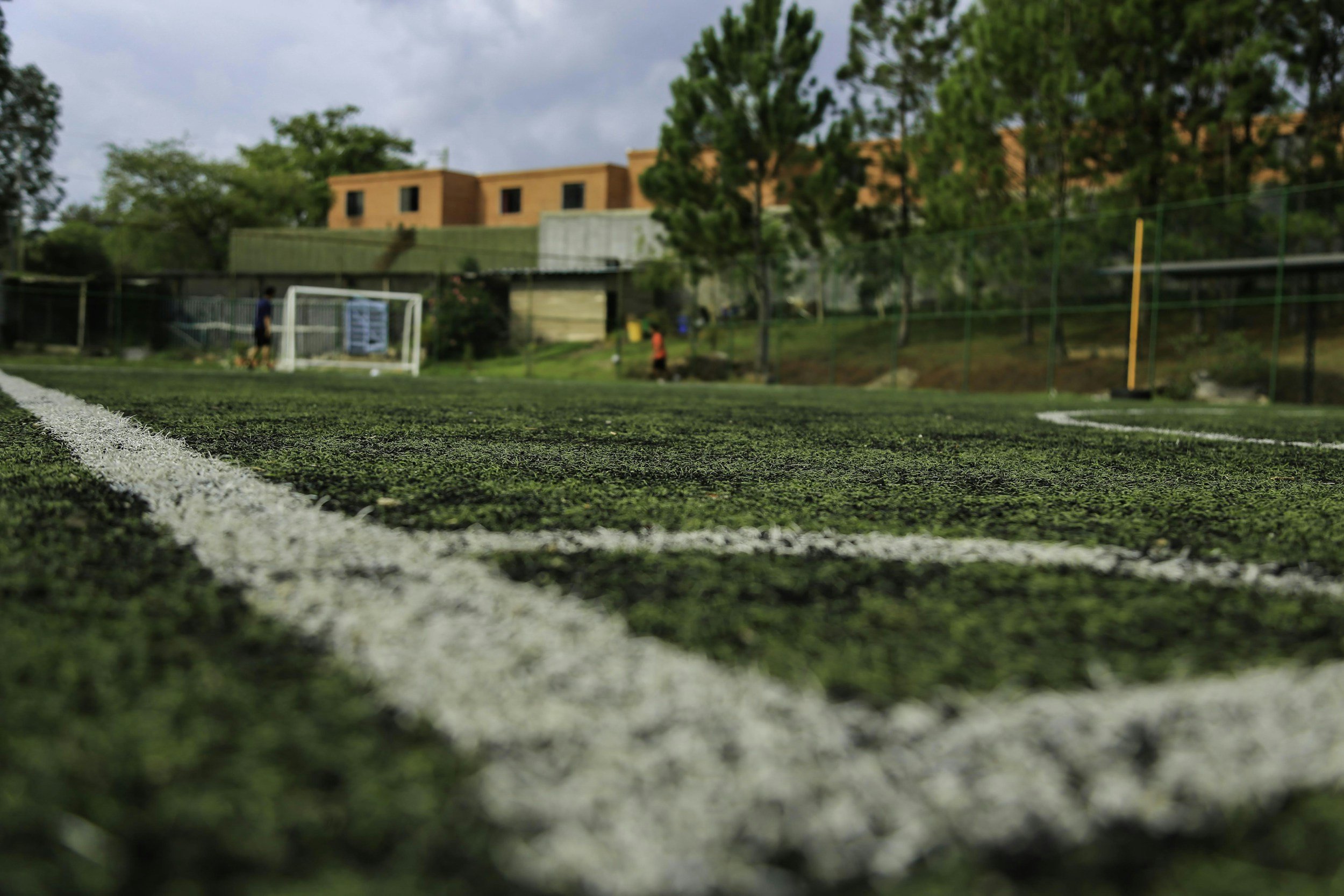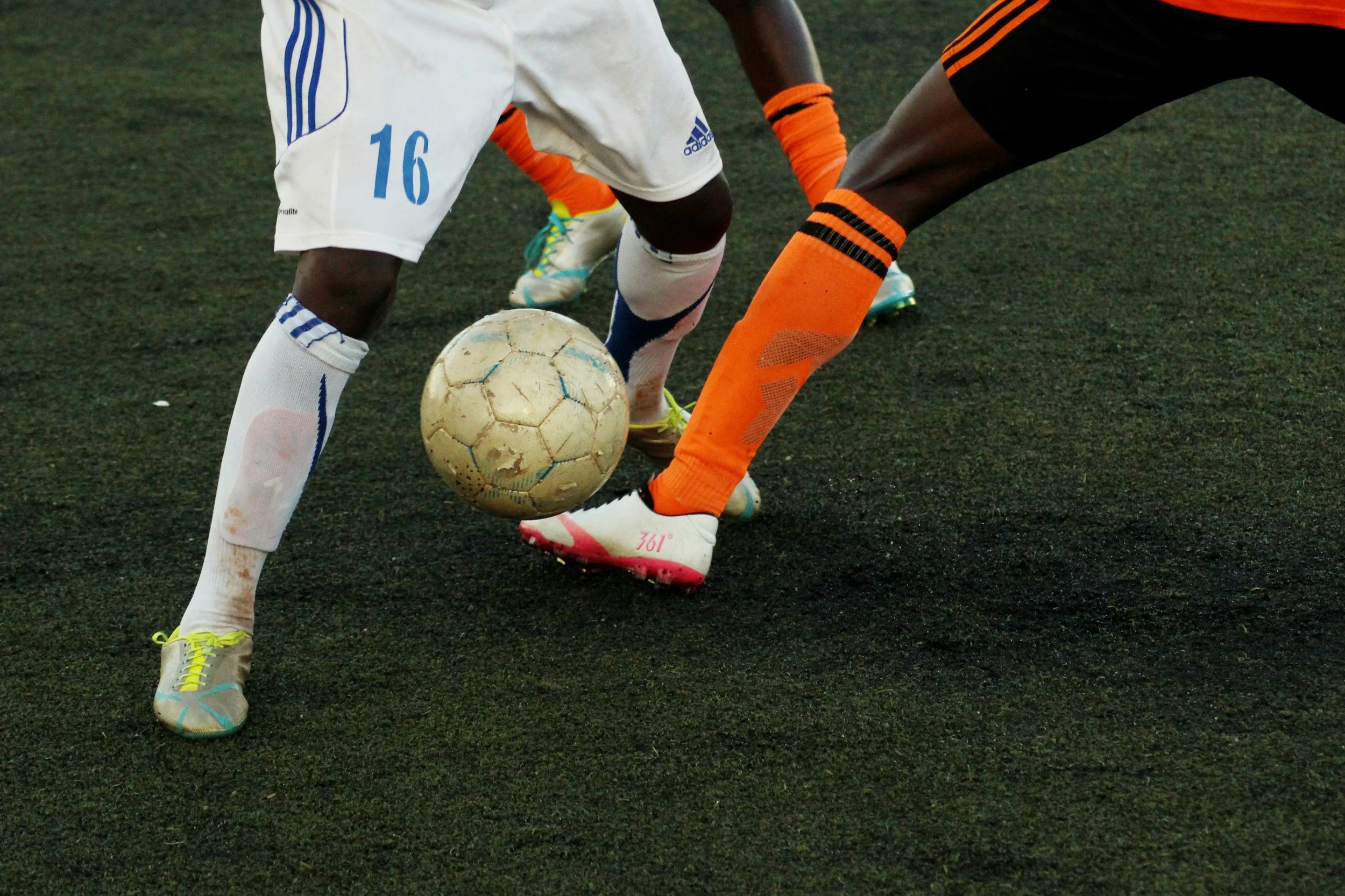
CAN SPORT EVENTS HEAL DIVIDED NATIONS? LESSONS FROM CAMEROON’S AFCON GAMBLE
Cameroon’s AFCON 2022 showed how mega sporting events can ignite fleeting national pride—but without inclusive, long-term reform, they risk deepening the divides they aim to heal.
Dr Jo Clarke (Leeds Beckett University, UK).
Becky Ashworth (Sheffield Hallam University, UK).
EXECUTIVE SUMMARY
· Cameroon’s hosting of AFCON 2022 showcased both the potential and pitfalls of using mega sporting events for national unity and global image-making.
· While football briefly united citizens, the tournament failed to address deep-rooted social and political divides, particularly the Anglophone crisis.
· Massive infrastructure investments enhanced Cameroon’s global profile but had limited impact on structural inequalities or political exclusion.
· Governments often instrumentalise sport as soft power while sidelining genuine reform, exacerbating tensions rather than resolving them.
· Event leaders must shift from superficial spectacle to inclusive, accountable planning if mega-events are to deliver meaningful, lasting legacies.
INTRODUCTION
Can Football Heal a Fractured Nation? Cameroon’s AFCON Dilemma
When Cameroon hosted the delayed Africa Cup of Nations (AFCON) in 2022, the government promised more than just football. They promised unity. New stadiums rose from the ground. Roads, hotels, hospitals—all symbols of progress. International broadcasters beamed Cameroon’s cultural richness across the globe. For a nation grappling with decades of civil unrest and violent separatist tensions, football wasn’t just a game—it was positioned as a political salve (Acha-Anyi, 2023).
For fleeting moments during the tournament, it worked. Streets emptied as fans across linguistic, ethnic, and regional divides huddled together, cheering their ‘Indomitable Lions.’ A bronze medal finish, dramatic matches, and a proud display of Cameroonian resilience momentarily eclipsed deep-rooted tensions.
But the cheering didn’t last.
Beyond the packed stadiums and national pride lay a far more uncomfortable truth. The Anglophone crisis continued unabated. Armed clashes displaced millions. Civilian suffering persisted. And a tragic stadium stampede during AFCON exposed glaring safety failures, undermining the carefully polished image.
This isn’t unique to Cameroon. Across the world, governments have turned to mega-events—sporting spectacles in particular—as shortcuts to unity, legitimacy, and nation branding. But what happens when the symbolism ends, and reality returns?
Cameroon’s experience is a powerful reminder: you can build world-class stadiums in months, but you can’t plaster over decades of division with football alone. Events can amplify pride—but they cannot resolve structural inequality or deep political fractures. It’s time we faced that hard truth.
“You can build world-class stadiums in months, but you can’t plaster over decades of division with football alone.”
THE PROBLEM AND/OR OPPORTUNITY
Cameroon’s AFCON 2022 showcased a dilemma facing many nations that host mega sporting events: how to leverage global spectacles for nation building without ignoring deep-rooted domestic crises. On paper, the opportunity is irresistible. Hosting a major tournament promises jobs, tourism, infrastructure, and an enhanced international reputation. Politically, it offers governments a rare moment to rally citizens, project unity, and reset global perceptions (Musikavanhu et al., 2021).
But this strategy carries inherent risks. When events are used to paper over unresolved social divisions—rather than as part of wider structural reforms—the result is often superficial unity that evaporates as soon as the final whistle blows.
Worse still, it can deepen feelings of exclusion among marginalised groups, exacerbating tensions rather than resolving them.
The problem is clear: too often, mega-events prioritise appearances over substance. But the opportunity remains—if events are planned and leveraged differently. Cameroon’s experience illustrates both the promise and the peril of using sport as a tool for national unity and global rebranding. It’s a timely lesson for any nation tempted to conflate sporting success with sustainable nation building.
The stakes for getting this right have never been higher. Around the world, fragile states, emerging economies, and politically divided nations are increasingly turning to mega-events—sporting tournaments, cultural festivals, expos—as vehicles for unity, legitimacy, and global repositioning. But the cracks are starting to show.
Cameroon’s AFCON took place against a backdrop of escalating separatist violence, mass displacement, and simmering civil unrest. Yet, the government invested nearly £700 million to host the continent’s biggest football tournament, hoping stadiums and spectacle could symbolically heal decades of division. It didn’t.
WHY DOES THIS MATTER NOW?
This is not an isolated case. From Brazil’s World Cup protests to Qatar’s contested global image, the tension between spectacle and substance is playing out across event hosts worldwide. At the same time, the pressure on events to deliver tangible legacy—beyond branding—is intensifying (Preuss, 2019). Stakeholders, citizens, and global audiences are increasingly sceptical of grand promises that fail to translate into meaningful, long-term change.
As more nations face this decision, the lessons from Cameroon reveal why symbolism alone is no longer enough—and why events must evolve from PR tools into catalysts for real, inclusive progress.
For decades, policymakers, scholars, and event strategists have touted mega sporting events as powerful instruments for nation branding, soft power, and national unity (Heslop et al., 2013). The prevailing wisdom suggests that events like AFCON, the FIFA World Cup, or the Olympic Games provide hosts—particularly in the Global South—with rare opportunities to reposition themselves on the world stage, attract investment, stimulate tourism, and foster domestic pride.
But Cameroon’s AFCON experience exposes the limitations of this narrative. While much of the existing literature highlights the symbolic value of sport in promoting unity, few studies confront the reality of how temporary, fragile, and politically instrumentalised this unity can be, especially in nations grappling with deep-seated social unrest.
HOW DOES THIS ADD TO WHAT WE ALREADY KNOW?
This case reveals the uncomfortable gap between global image management and lived domestic realities. It challenges the assumption that nation branding through sport naturally translates into cohesion or progress, urging us to rethink simplistic cause-effect models of event impact.
In doing so, it contributes to a growing body of critical research questioning whether mega-events are truly vehicles for inclusive nation building—or merely costly performances that mask deeper structural divides.
WHAT IDEAS DRIVE THIS ARTICLE?
This analysis draws on the concept of nation branding, which refers to how states strategically use symbols, narratives, and global platforms to shape international perceptions and domestic identity (Onwumechili & Akindes, 2014). In Cameroon’s case, AFCON 2022 was deliberately framed by political leaders as both a moment of unity and a vehicle for projecting an image of stability, development, and cultural richness to the world.
The article is grounded in qualitative insights from field research we conducted and work that integrates perspectives from political science, sport management, and critical event studies.
Through interviews, policy analysis, and observation of the tournament, they reveal how football in Cameroon operates not simply as entertainment, but as a politically charged tool of soft power, identity construction, and legitimacy building (Clarke & Sunday Ojo, 2016). However, their research also exposes the disjuncture between the short-lived unity generated by the tournament and the ongoing exclusion, conflict, and displacement affecting millions, particularly in Cameroon’s Anglophone regions.
The methods foreground lived experience and political context—offering a nuanced, real-world lens on the promises and limits of mega-event nation branding.
Key Arguments
-
Mega sporting events like AFCON hold undeniable power to generate moments of unity—but those moments are fragile, conditional, and politically manipulated. In Cameroon, football is more than a game (Tichaawa & Hemmonsbey, 2022). Referred to as the ‘King Sport,’ it carries deep cultural, social, and political weight. The government has long used football successes to distract from internal crises, bolster national pride, and reinforce state legitimacy.
During AFCON 2022, this dynamic was clear. Across cities and villages, Cameroonians of different backgrounds temporarily set aside linguistic, ethnic, and political divisions to cheer for their national team. Streets fell silent during matches, public spaces transformed into shared arenas of celebration, and even in the conflict-affected Anglophone regions, some residents joined in the football fervour.
Yet this unity was fleeting.
This research highlights, football's unifying effect evaporated as quickly as it emerged (Clarke & Sunday Ojo, 2016). The Anglophone crisis, marked by armed clashes, political repression, and mass displacement, remained unresolved. Celebratory headlines masked a deeper fracture—a nation still struggling with exclusion and marginalisation.
Rather than addressing root causes of division, AFCON revealed how sport’s symbolic power can distract, pacify, or even worsen social tensions if not paired with meaningful, structural change.
-
The promise of nation branding through mega-events is seductive—particularly for countries like Cameroon seeking to reposition themselves internationally (Tichaawa & Hemmonsbey, 2022). With global media broadcasting images of packed stadiums, modern infrastructure, cultural performances, and competitive football, AFCON 2022 was meticulously crafted to project Cameroon as stable, welcoming, and investment-ready.
And to some extent, it worked. The world saw new stadiums in Yaoundé, Douala, Bafoussam, and Limbé. Cameroon’s third-place finish was celebrated internationally. The government spotlighted extensive investment—over £680 million—in roads, airports, hotels, and sports facilities. International media carried images of colourful fan zones, vibrant culture, and national pride.
But beneath the surface, contradictions simmered.
In Cameroon’s Anglophone regions, the spectacle of AFCON meant little to communities experiencing ongoing conflict, forced displacement, and political exclusion. This research reveals, nation branding efforts were disconnected from the lived realities of marginalised groups.
This disconnect matters. It breeds resentment, deepens perceptions of inequality, and risks turning mega-events into symbols of exclusion rather than unity. Cameroon’s case underscores a broader lesson: successful nation branding requires more than polished images—it demands inclusion, dialogue, and tangible improvements for those most affected by division.
-
Mega-events often leave behind impressive physical legacies—new roads, airports, hotels, stadiums—visible symbols of progress. Cameroon’s AFCON 2022 was no different. The Olembé Stadium in Yaoundé, costing over £222 million, stood as a centrepiece of national pride. Across the country, infrastructure upgrades signalled to global investors and tourists that Cameroon was open for business.
But infrastructure alone cannot rebuild fractured societies.
Despite the substantial investment, the core social challenges remained untouched. The Anglophone crisis continued (Konings & Nyamnjoh, 2003). Millions were still displaced. Feelings of exclusion among marginalised groups deepened. And tragically, the tournament itself exposed organisational failings. A deadly stampede at the Olembé Stadium killed multiple spectators, raising serious questions about event safety and governance capacity.
This reflects a global pattern. From Brazil’s World Cup protests to South Africa’s post-2010 frustrations, mega-event infrastructure rarely addresses underlying inequalities. Instead, governments prioritise visible, marketable legacies—physical structures over social structures.
As this work emphasises, without parallel investment in social cohesion, inclusive governance, and community engagement, the most impressive stadiums risk becoming monuments to missed opportunities.
Infrastructure may symbolise modernisation—but it cannot, on its own, heal political wounds or substitute for meaningful reconciliation.
-
In Cameroon, as in many nations, football is not just entertainment—it is politics by other means. Governments have long understood that sport, particularly football, offers a potent tool for political communication, legitimacy, and soft power. AFCON 2022 became the latest example of this calculated instrumentalization (Tichaawa & Hemmonsbey, 2022).
President Paul Biya, in power for over four decades, framed the tournament as a moment of “brotherhood” and national togetherness. His administration leveraged football to project strength, unity, and stability to domestic and international audiences alike. High-profile figures such as football icon Samuel Eto’o were positioned not just as sports leaders but as political actors reinforcing state narratives.
But behind the carefully curated images, Cameroon’s political divisions deepened. This research reveals, the government's use of football to distract from the Anglophone crisis only highlighted the limits of sport as a tool for nation building. Temporary displays of unity masked enduring repression, unresolved grievances, and structural exclusion.
This is not unique to Cameroon. Across the globe, governments employ sport to divert attention from domestic challenges, project soft power, and consolidate authority. But when symbolic performances replace substantive reform, the credibility of both sport and state suffers.
Sport can unify temporarily—but without addressing root causes, it risks becoming just another political performance.
-
Perhaps the most enduring myth of mega-events is that they can serve as quick fixes for complex social, political, or economic problems. Governments, sponsors, and event organisers routinely promise transformative legacies—national unity, global prestige, economic growth, and social progress. Yet, as Cameroon’s AFCON 2022 demonstrates, these promises often unravel once the spectacle ends (Nyikana & Tichaawa, 2024).
For a few weeks, AFCON generated genuine pride. Cameroonians rallied behind their national team. The bronze medal finish was celebrated across cities and villages. Even some within the Anglophone regions, despite ongoing conflict, shared fleeting moments of collective joy. On the surface, the tournament succeeded.
But the underlying fractures never disappeared. This research shows, once the cameras stopped rolling and the crowds dispersed, old tensions resurfaced. The Anglophone crisis continued. Armed violence, displacement, and political marginalisation remained entrenched. The AFCON legacy, while positive in terms of infrastructure and temporary tourism boosts, failed to deliver long-term social cohesion or reconciliation.
This pattern reflects a global reality. From South Africa 2010 to Brazil 2014, mega-events can inspire—but they rarely resolve structural challenges. Unity generated through sport is real—but it is often temporary, fragile, and insufficient in the absence of deeper, sustained reforms.
Mega-events are not solutions in themselves—they are platforms. Whether they catalyse real change depends entirely on how they are planned, leveraged, and connected to broader societal processes.
CONCLUSIONS
Cameroon’s hosting of AFCON 2022 exposes a hard truth facing nations that turn to mega sporting events as vehicles for unity and nation branding: stadiums can be built in months, but rebuilding fractured societies takes decades—and far more than football.
The tournament demonstrated both the potential and limitations of leveraging sport for nation building. On one hand, AFCON provided fleeting moments of pride, togetherness, and global visibility. It showcased Cameroon’s cultural richness, its sporting talent, and its ambition to project a modern, unified image to the world.
But beneath the surface, deep divisions remained. The Anglophone crisis, marked by violent conflict and mass displacement, was never going to be resolved through symbolic gestures, infrastructure projects, or high-profile matches alone. In some ways, the spectacle risked widening the gap between government narratives and lived realities—particularly for marginalised communities excluded from both the planning and the benefits of the event.
Cameroon’s experience reflects a broader lesson for the global events community: mega sporting events cannot be relied upon as shortcuts to political legitimacy, unity, or international prestige. Their success depends not on the scale of the spectacle, but on whether they are embedded within inclusive, transparent, and long-term strategies that address structural inequalities.
Sport can ignite pride. It can amplify identity. But without meaningful reform, the unity it generates remains temporary—and the legacies promised by mega-events risk becoming monuments to missed opportunities.
“Stadiums can be built in months, but rebuilding fractured societies takes decades—and far more than football.”
PRACTICAL ACTIONS
If Cameroon’s AFCON 2022 experience has made one thing clear, it is this: successfully hosting a mega sporting event today requires far more than building infrastructure or staging an impressive show. The real measure of success lies in how events are used as platforms for inclusive, sustainable, and transparent development that meaningfully addresses social and political challenges.
For event managers, policymakers, and international governing bodies, several key actions emerge:
1. Prioritise Inclusive Event Planning from the Start
Too often, mega-events are designed by political elites and technocrats, with little input from the communities most affected. Governments and event organisers must embed genuine community engagement into every stage of event planning—from bidding through delivery and legacy development. In conflict-affected or divided societies, this includes proactive dialogue with marginalised groups, civil society, and local leaders to ensure the event reflects diverse needs, not just central government ambitions.
2. Integrate Social Impact into Legacy Frameworks
Infrastructure and tourism boosts are important, but they must be accompanied by clear, measurable social impact goals. Legacy frameworks should extend beyond economic growth to include social cohesion, political inclusion, and human rights. This means setting targets for community participation, equitable resource distribution, and long-term benefits that reach beyond event zones and elite stakeholders.
3. Strengthen Accountability and Transparency Mechanisms
Events like AFCON carry significant public investment—over £680 million in Cameroon’s case. Governments, organisers, and international federations must enforce rigorous transparency in how funds are spent, how contracts are awarded, and how benefits are distributed. Independent oversight bodies and civil society monitoring can help prevent corruption, exclusion, or misuse of mega-events for purely political gain.
4. Avoid Overpromising Unity or Transformation
One of the most damaging legacies of mega-events is the gap between inflated promises and disappointing realities. Politicians and event promoters must be realistic about what sport can—and cannot—achieve. Events can spark pride and temporarily lower social tensions, but they cannot substitute for structural reform, political dialogue, or peacebuilding. Managing expectations helps avoid disillusionment that undermines both event legacies and public trust.
5. International Federations Must Reform Bidding Criteria
Governing bodies like CAF, FIFA, and the IOC must strengthen criteria for awarding mega-events, especially in politically sensitive contexts. This includes assessing not only infrastructure readiness but also social stability, human rights, and host government commitments to inclusive development. Awarding events purely based on market potential or geopolitical alliances perpetuates the misuse of sport for political theatre without addressing root causes of division.
6. Align Events with Broader Development Agendas
Mega-events should complement, not distract from, existing national development strategies. In Cameroon, AFCON could have been better aligned with Vision 2035’s social goals—ensuring investments in infrastructure were accompanied by tangible progress in addressing inequality, political exclusion, and regional grievances.
Ultimately, events like AFCON are platforms, not panaceas. Leaders must treat them as catalysts for long-term change, grounded in realism, inclusivity, and accountability—not as superficial performances designed to momentarily mask deeper fractures.
IMPLEMENTATION CHALLENGES
While these recommendations are critical, applying them in practice is fraught with complexity. First, the political realities of many host nations—especially those grappling with civil unrest, fragile governance, or authoritarian tendencies—often limit genuine community engagement or transparency. Governments may resist scrutiny, fearing that exposing divisions undermines their nation branding efforts.
Second, the global events system itself incentivises spectacle over substance. International federations prioritise market size, infrastructure capacity, and global visibility, often sidelining questions of social justice, inclusion, or long-term community benefit. Reforming these systems requires significant political will and institutional change that remains elusive.
Finally, there are inherent limits to what events can achieve in deeply divided societies. No tournament, however well planned, can resolve decades of inequality, conflict, or exclusion overnight. Mega-events must be positioned realistically—as tools that can contribute to, but not replace, sustained political dialogue, structural reform, and peacebuilding.
Without acknowledging these constraints, even well-intentioned interventions risk reinforcing the very divides they aim to heal.
REFERENCES
Acha-Anyi, P. N. (2023). Sports events and community development: Analysis of the AFCON 2022 host cities in Cameroon. Cogent Social Sciences, 9(1). https://doi.org/10.1080/23311886.2023.2195079
Clarke, J., & Sunday Ojo, J. (2016). Sport policy in Cameroon. International Journal of Sport Policy and Politics, 9(1), 189-200.
Heslop, L. A., Nadeau, J., O'reilly, N., & Armenakyan, A. (2013). Mega-event and country co-branding: Image shifts, transfers and reputational impacts. Corporate Reputation Review, 16, 7-33.
Konings, P. & Nyamnjoh, F. (2003). Negotiating an anglophone identity, Boston: Brill Leiden.
Musikavanhu, R. R., Ladkin, A. & Sadd, D. (2021). The Lasting Social Value of Mega Events: Experiences from Green Point Community in Cape Town, South Africa. Journal of Sustainable Tourism, 29(11-12), 1832-1849.
Nyikana, S., & Tichaawa, T. M. (2024). Towards an integrated framework for sustainable sport tourism development in Central Africa. Development Southern Africa, 1–15.
Onwumechili, C. & Akindes, G. (2014). Identity and Nation in African Football: Fans Community and Clubs, London: Palgrave Macmillan.
Preuss, H. (2019). Event Legacy Framework and Measurement. International Journal of Sport Policy and Politics, 11(1), 103-118.
Tichaawa, T.M. & Hemmonsbey, J.D. (2022). Destination Branding though Major Sporting Events: The Case of the 2021 Africa Cup of Nations in Cameroon. Geosport for Society, 17 (2), 142-156
AUTHOR(S)
Dr Jo Clarke, Senior Lecturer, Leeds Beckett University, UK.
Jo is a Senior Lecturer in Sport Business Management in the Carnegie School of Sport. She is dedicated to leveraging sport for social change, cultural exchange, and global impact through her teaching, research, and industry experiences in the UK and overseas.
Jo brings combined expertise in academia and industry, with a professional journey focused on leveraging sport as a tool for diplomacy, development, cultural exchange, and advancing a social justice agenda. With a foundation in global sport policy, corporate social responsibility, and sport-for-development, she draws on extensive experience working in the UK, Africa, New Zealand, India, and Hong Kong, both as an academic and sport industry professional, to create sustainable global impact through sport.
Her PhD critically examined power dynamics and partnerships in the international Sport for Development and Peace sector, using ethnographic methods to explore the impact of global initiatives on Cameroonian sport practitioners and community leaders. Also, Jo has worked with organisations such as the Yorkshire Cricket Foundation, Cricket Without Boundaries, Badminton England, Harbour Sport, and Tennis New Zealand, bridging academia and industry to promote equity, empower communities, and drive sustainable development. She has also served as a consultant for clients including Chance to Shine, the ECB, RFU, and the Cameroon Olympic Committee, contributing expertise on evaluation and impact, community development, corporate social responsibility, and strategy development.
Becky Ashworth, Senior Lecturer, Sheffield Hallam University, UK.
Becky is a dedicated professional with a wealth of experience in the field of sport business management. As the Course Leader for the BSc Sport Business Management programme at Sheffield Hallam University, she brings a unique blend of academic knowledge and practical expertise to her role. Becky’s journey in the world of sport began with her studies at Sheffield Hallam University, where she developed a deep understanding of the industry.
Building upon her academic foundation, she ventured into the sports industry working within a National Governing Body in various capacities. Her hands-on experience includes roles at major events, such as the Paris 2024 Olympic Games, Women’s Euro 2022 and Birmingham 2022 Commonwealth Games, where she gained invaluable insights into event management and operations. In addition to her industry experience, Becky’s passion for coaching led her to work with the Great Britain squad for the Paralympic sport of Goalball, further enriching her understanding of the challenges and international landscape of the sport industry. With her comprehensive background and dedication to sports business management, she is committed to nurturing the next generation of sport business professionals and equipping them with the skills and knowledge needed to succeed in this dynamic field.
Disclaimer
The views and insights expressed in this article are those of the author(s) and reflect their research and professional expertise. They do not represent the views of the Centre for Events & Festivals CIC or its partners.









